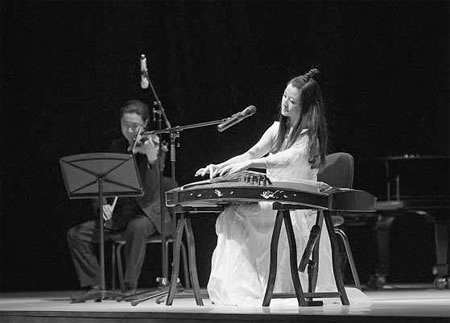
Chang Jing used to keep her hair long, but says she wants to bring the art of guzheng up to date with a change of image. Provided to China Daily
Guzheng soloist Chang Jing has had a radical haircut before her concert on June 9 at the Poly Theater of Beijing. With short hair, she looks different from the usual image of a longhaired beauty, commonly associated with a guzheng (Chinese zither) musician. Her haircut, however, angered the concert's producer, who is afraid that people might want to return their tickets when they see a different Chang from the poster.
"I want to show that the guzheng can be very modern," she says. "I'm trying to present another side of guzheng."
Though Chang is best known for her performance of the classic Chinese work Spring River on a Moonlit Night at the opening ceremony of the Beijing Olympic Games in 2008, she is more often seen playing guzheng in unconventional ways.
At the CCTV Spring Festival Gala in February, Chang collaborated with Greek New Age musician Yanni. She also played a guzheng concerto under the baton of Lorin Maazel, and performed with world music artist Zhu Zheqin and French pianist Richard Clayderman.
"I want to express contemporary people's feelings through the guzheng," she says.
Originating during the Warring States Period (475-221 BC), the guzheng is a Chinese plucked zither of 18-23 or more strings and movable bridges. It is the ancestor of several Asian zither instruments, such as the Japanese koto, the Mongolian yatga, and the Korean gayageum.
Born in Chengdu, capital of Sichun province, Chang began to study the guzheng at the age of 8. She later graduated from China Conservatory of Music and became a performer with the China National Song and Dance Ensemble.
Her task in the ensemble was mainly to perform traditional guzheng repertory such as The General's Command and Ambushes from Ten Sides.
However, she was bored by playing these tunes all the time, and began to look for new music languages.
After listening to all kinds of crossover music from around the world, Chang started to do it herself. She recorded for films such as Zhang Yimou's Hawthorn Tree Forever and Wong Kar-wai's Ashes of Time, and composed for dance works of avant-garde choreographers such as Wang Yuanyuan and Shen Peiyi. In 2010, she founded a new ensemble that consists of both guzheng and Western instruments, like violin and piano.
"There are enough people who play traditional guzheng works," she says. "I want to do something different."
At Chang's concert on June 9, she will perform with cellist Song Zhao, violinist Jin Haiyin, and percussionist Wang Jianan. All the works are composed by Chang and her husband Qi Gang.
The concert will be divided into three parts, named after three Chinese characters pronounced as "jing" - but with different meanings. The first part is "serenity", which tries to calm down the concertgoers, who have just arrived from work.
"I have been trying to play guzheng to cultivate my mind, and I hope the audience will do the same with me," Chang says.
The second part is titled "mirror" to imply the reflection of listeners in music. The third part is titled "horizon", which indicates the effect that guzheng music will have on the audiences.
Special lighting will help to add to the atmosphere and offer a unique experience for the audience. Chang believes every concertgoer will have his or her own feeling about the music, but she hopes everybody will have an inner dialogue with the music.
Chang will not only play the guzheng, but also sing at the concert. Among her vocal works is Flying of the Falling Flowers, a tune she composes with the inspiration of Tang Dynasty (618-907) poet Li Yu.
Besides performing, Chang works to promote guzheng internationally. One of her students is Princess Chulabhorn Walailak of Thailand, whom she meets every three months, in China, Thailand or elsewhere in the world.
"I hope guzheng will not only be a Chinese instrument, but also enjoyed by the whole world," she says.
muqian@chinadaily.com.cn
We recommend:
